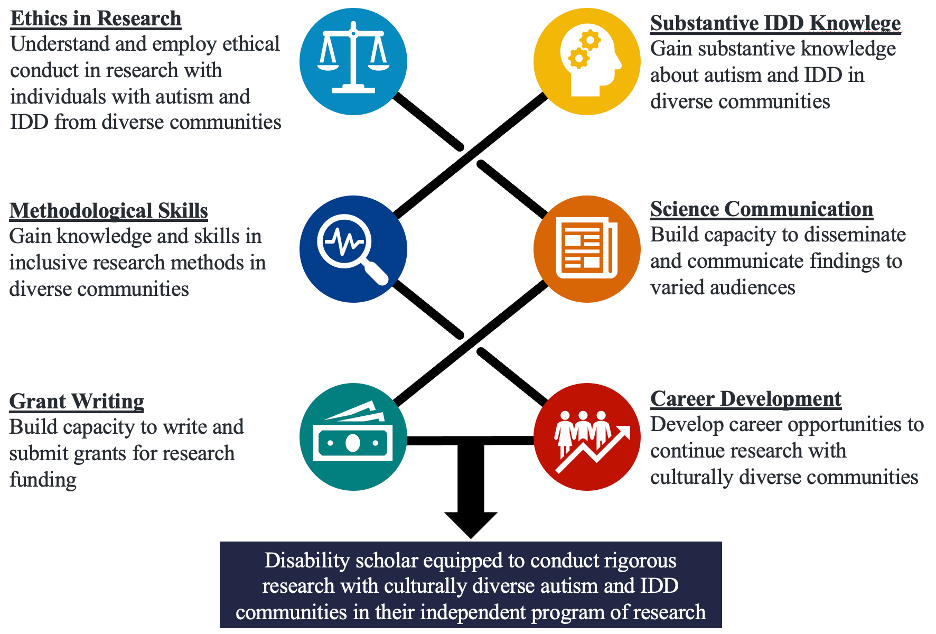This postdoctoral training seeks to increase capacity among researchers who focus on individuals with IDD and their families in culturally diverse communities. This opportunity is open to all qualified applicants.
Texas Center for Disabilities at the Steve Hicks School of Social Work offers this postdoctoral training through an award (90ARCP0009) from the National Institute on Disability, Independent Living, and Rehabilitation Research.

How to Apply
- One to two post-doctoral fellow positions open
- Applications will be reviewed on a rolling basis.
- Application materials:
– Cover letter (please list at least 2 mentors you are interested in working with in the letter)
– Curriculum vitae
– Two-page (single-space) statement describing research interests, experience, eligibility, training needs and career plans
– Writing sample
– Three letters of recommendation - Upload application materials here
- Direct Inquiries to program directors:
- Sandy Magaña, PhD, Texas Center for Disability Studies, Steve Hicks School of Social Work smagana@austin.utexas.edu
- Sandra B. Vanegas, PhD, Texas Center for Disability Studies, Steve Hicks School of Social Work sandra.vanegas@austin.utexas.edu
Highlights
- Annual $65,000 stipend, health insurance stipend, and travel/professional development allowance.
- This is a one-year fellowship, starting in fall 2024, with the possibility of a second year, contingent on satisfactory progress.
- Postdoctoral fellows will further their research and training agendas through formal mentorship and coursework, seminars, conferences, and other career development activities.
- Each fellow will have a primary and secondary mentor. They will work with established investigators on research projects and be expected to prepare and submit manuscripts for publication, present at local and national conferences, and develop and submit at least one grant proposal by the end of the fellowship term.
- Fellows will be trained in community living, engaging diverse communities in research, participatory research methods, and intervention research.
Eligibility
- This opportunity is open to all qualified applicants.
- Applicants are required to possess a Ph.D. or Doctorate in a relevant discipline.
- Applicants must be a citizen, permanent resident, or have an appropriate training visa.
Mentors
- Texas Center for Disability Studies
- Steve Hicks School of Social Work
- Other UT Austin Colleges/Schools
Sandy Magaña, Ph.D., MSW
Professor in Autism and Neurodevelopmental Disabilities, TCDS Executive Director
View DetailsEsther J. Calzada, Ph.D.
Associate Dean for Research
Norma and Clay Leben Professor in Child and Family Behavioral Health
View Details- Lauren Hampton, PhD, Assistant Professor, Department of Special Education
- Audrey Brumback, MD, PhD, Assistant Professor, Departments of Neurology and Pediatrics
- Jonathon Pierce, PhD, Associate Professor Department of Neuroscience
- Heather Becker, PhD Research Scientist in the School of Nursing
- Julia Campbell, PhD, AuD, CCC-A, F-AAA, Assistant Professor, Department of Speech Language and Hearing
Expectations
Postdoctoral fellows are expected to spend about half of their time working independently and about half of their time working together with their mentor(s). In addition, they are expected to regularly attend seminars, submit manuscripts for publication, make local and national scientific presentations, and submit at least one grant proposal for external funding.
Frequently Asked Questions
Do I need to officially graduate before I begin the fellowship?
No, however, you should have completed all requirements for the doctoral program and defended your dissertation before the start of the fellowship.
Are there funds available to help with moving expenses?
No, this is not an allowable expense.
Can I expect an increase in the stipend level for the second year?
You can expect the same salary throughout.
What if I get a job offer before the fellowship period ends?
The end date is negotiable. Appointments are normally made in 12-month increments, and no trainee may be appointed for less than 9 months during the initial period of appointment.
Is there a possibility to extend the fellowship for a third year?
Yes, on a case-by-case basis.
What will the office space look like?
Fellows will share an office at the Texas Center for Disability Studies offices on the UT JJ Pickle Research Campus. They will also have access to a shared postdoc space at the Steve Hicks School of Social Work building on the main campus.
What kind of computer will I have?
Fellows will order a new desktop or laptop computer plus necessary software with assistance from the Office of the Associate Dean for Research (OADR).
Are there funds to recruit my own research assistants?
There is no funding to hire research assistants through the AART grant; however, you could consider supervising an intern who wants to gain research experience. You are also encouraged to apply for internal and external grants for such purposes.
How will authorship be attributed in collaborative projects?
Authorship will be negotiated with your mentor(s) and/or collaborators.
Will I have protected time to work on my dissertation papers?
Yes. If applicable, you will be expected to prepare manuscripts from your dissertation and you will have protected time to do so. Your specific schedule and time spent on various projects will be negotiated with your mentor(s).
How many vacation days, sick days, and holidays will be provided?
Time off will be negotiated with your primary mentor.
Are there funds to support training workshops and formal coursework?
Yes. There is allowance for professional development which can include training workshops and tuition.
Will health insurance be provided?
Yes. Your stipend will be supplemented by $4,800 to purchase insurance through UT Austin or on your own. You may elect to enroll in health insurance with the university’s group insurance program through our Human Resource Service Center. You can find additional information on the insurance coverage, including how to start enrollment on the following webpage: https://hr.utexas.edu/current/insurance/research-affiliate-postdoctoral-fellow.

